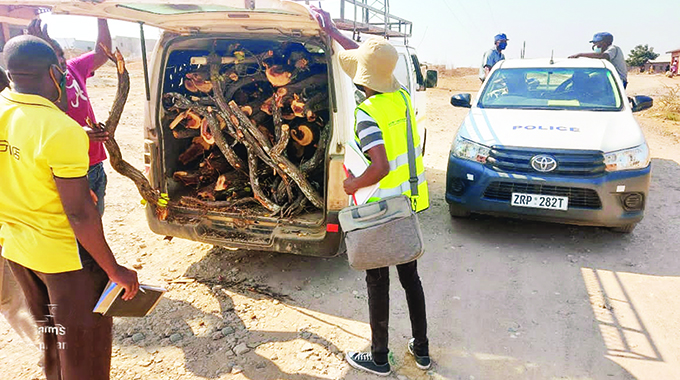Source: Blitz targets firewood markets, traders | The Herald
Herald Reporters
Harare Metropolitan province, Zimbabwe’s largest single market for illegally cut tree products, will be playing its part in the blitz to protect indigenous forests by closing down the illegal markets for timber, firewood and charcoal.
Zimbabwe loses 262 000 hectares of indigenous forest each year and there is a national drive to end all illegal woodcutting and marketing.
In a joint statement yesterday, Harare provincial development coordinator Mr Tafadzwa Muguti and Forestry Commission general manager Mr Abednigo Marufu said Harare was joining the rest of the nation in the blitz which started on August 2.
“This comes at a time when Zimbabwe loses its forests at an average of 262 349 hectares per annum. Currently, the main focus is on compliance with the relevant laws and procedures to serve our forest resource,” reads the statement.
Mr Muguti and Mr Marufu said they would be deploying teams from collaborating agencies: Forestry Commission, police, the Environmental Management Agency and the municipal police.
The teams would be deployed to all timber, firewood and charcoal activity hotspots to check on, and enforce compliance of those involved in the acquisition, movement, processing and trading of firewood and related forest products.
“The teams will be conducting round-the-clock patrols and strategic roadblocks throughout the province to check on, and stem the prevalence of firewood or charcoal and other related environmental crimes,” they said.
Mr Muguti and Mr Marufu said the province is forthwith declaring zero tolerance to the entry of any illegal timber, firewood or charcoal, and or processing of these within its boundaries.
“Furthermore, any persons or companies found processing and selling timber without the requisite licences from the Forestry Commission risk having their timber and saw milling equipment confiscated,” they said.
Mr Muguti and Mr Marufu said the conservation of forest resources was taking centre stage globally due to their pivotal role in climate change mitigation.
“Trees and forests constitute the major carbon sink that removes carbon dioxide from the atmosphere to minimise global warming, thus controlling the progression of climate change. In addition to this role, they act as an essential link in the hydrological cycle which is responsible for rainfall formation,” said the statement.
At national level, all the major rivers had their sources in forested watersheds and these also provided habitats for wildlife, which contributed significantly to the growth of tourism in Zimbabwe.
“On the same note, the success of agriculture in Zimbabwe, which is largely rain-fed, is dependent on good forest management as this determines the level of precipitation the country receives.
More than 62 percent of the total energy demand in Zimbabwe is supplied by trees and forests. The population of Harare Metropolitan province is a major consumer of firewood and charcoal, yet it does not have much in the way trees and forests to meet its energy demand. This means there is somewhere in Zimbabwe where this firewood must be coming from.”
There was need for compliance with the Forest Act which governed the acquisition, movement and trading of firewood.
“There are systems also put in place involving inspections, licences and permits which facilitate the legal process in this regard,” said the statement.
Meanwhile, the Forestry Commission has launched a blitz against firewood poachers in Beitbridge, where there is rampant cutting down of trees and selling in the border town, especially in villages within a 40km radius.
The district forestry officer, Mr Zibusiso Ndlovu said they had enlisted the services of the natural resource committee, chaired by the district development coordinator.
The committee also has police, the Environmental Management Agency (EMA), Agricultural Extension Services (AGRITEX) Beitbridge Rural District Council, traditional leaders and politicians.
Mr Ndlovu said the blitz was launched on Monday last week and that so far, 37 people among them businessmen running the firewood poaching syndicates had been arrested.
“According to our estimates, a total of 90 tonnes of firewood illegally extracted is being consumed in the border town daily through both domestic and commercial use.
“After noting, and increase in such activities, we then roped in other stakeholders and the impact on the ground so far is massive.
“We are targeting, businesses and individuals operating at hot spot areas mostly at business centres in the western suburbs, medium density and those operating from the Central Business District (CBD),” he said.
Mr Ndlovu said after the blitz, they were looking at regularising between 10 and 25 (registered) firewood traders in Beitbridge town.
He said this will create an optimal environment for them to measure the exact volumes of firewood consumed by the town’s populace.
It is understood that the syndicates are illegally extracting firewood from villages including Mtetengwe, Malala, Mzingwane, Makakavhule, Mathavha, Mapayi, Mawale, Lutumba, Tshamnanga, Tshibidzanani, Andrews, the Limpopo Rover , A1 farms , and Mapolovhele
In addition, a load of firewood which is being sold in donkey pulled cart costs anything between R100 and R200 in the border town.
Newer Post
Schools re-opening preps advanced 
COMMENTS